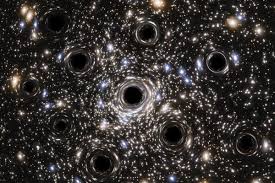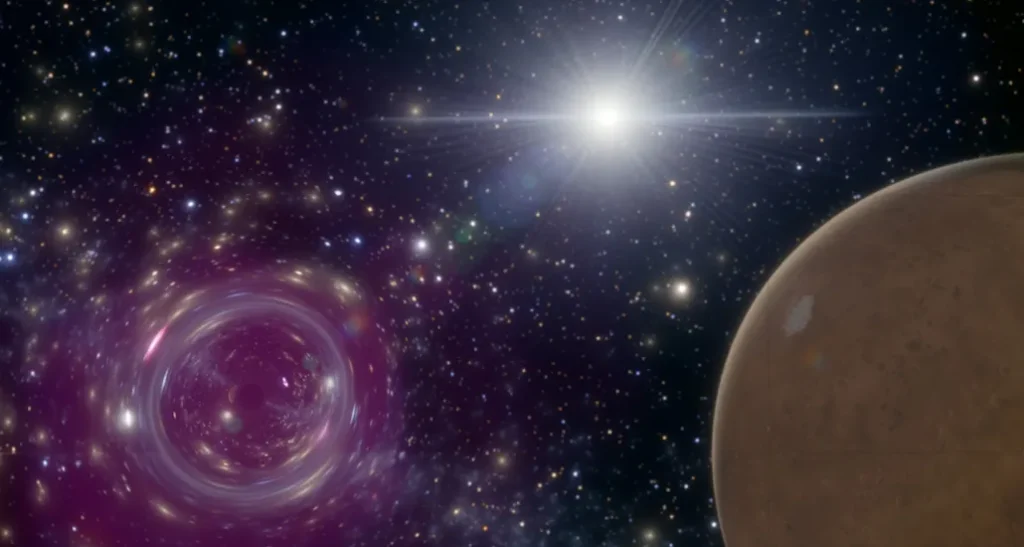Two study teams suggest the ways to look for these minuscule, fictitious particles, which would have an asteroid-like mass. They are referred to as primordial black holes since they would have originated during the early stages of the universe.
Black holes are fascinating objects in space time with extremely strong gravitational pulls. They have such intense gravity that nothing, not even light, can escape. They are formed when a massive star collapses under its own gravity at the end of its life cycle. The collapse compresses the star’s mass into a very small point known as a singularity.
While the term “hole” is used, black holes are not literally holes in space, but rather regions of spacetime with extreme gravitational effects.
Two groups of scientists suggest ways to look for these little, fictitious objects, which would be as massive as an asteroid. Primordial black holes get their name from the fact that they would have formed during the early stages of the universe.

Usually, a dying star collapses to create a black hole that is at least many times as massive as the sun. Smaller black holes may have developed in the early universe, according to some scientists, maybe as a result of quantum disturbances that directly collapsed parts of space.
Scientists have reported that a primordial black hole passing near a planet could have noticeable effects despite its small size.
Cosmologist Sarah Geller said. “The incredibly strong gravitational pull of this primordial black hole would cause Mars to wobble in its orbit around the Sun. Santa Cruz. Geller and her team, A National Science Foundation fellow at the University of California, plan to collaborate with experts in solar system simulations to analyze data for such wobbling.

Similarly, Cosmologist Sébastien Clesse and colleagues published in the same journal, suggesting that a flyby of a primordial black hole could disturb GPS satellites and other satellite networks. If a primordial black hole, roughly the mass of an asteroid, passed Earth within thousands or hundreds of thousands of kilometers, it could slightly alter the altitude of satellites in a detectable way.
Clesse said “It’s exciting to know that we have probes that could potentially detect these ‘baby black holes’ in our solar system’.
Primordial black holes with asteroid-like masses could pass through the inner solar system roughly once per decade. Fortunately, scientists have decades of data on satellite trajectories, and rovers and satellites around Mars provide similar data on the planet’s orbit.

Physicist Ben Lehmann of MIT, a coauthor of the planetary study explains, “Though regular asteroids might create signatures similar to those of primordial black holes, these black holes would travel at speeds of about 200 kilometers per second and originate outside the solar system, we’ve never observed an object passing through the solar system with the characteristics that would be associated with a black hole transit, to confirm the detection, scientists would ideally observe the wobble in real time and rule out any space rocks that might explain it.

Astrophysicist Andreas Burkert of Ludwig-Maximilians said that other factors, such as the solar wind of charged particles from the center of our solar system, could also affect planetary orbits He also points out that detecting a primordial black hole very close to the Earth could be an extremely rare event.”
What are Primordial Black Holes (PBHs)
Most of the cosmologists believe that primordial black holes produced within the second of the universe’s formation. Some of the heated material may have been so dense that this generated black holes, with masses ranging from 100,000 times smaller than a paperclip to 100,000 times greater than that of our Sun. Then, as the universe kept on expanding and cooled, the circumstances for creating black holes in this way stopped.

After almost 14 billion years, cosmologists have yet to find hard proof that these primordial black holes ever existed. But as the cosmos grew older, they may have disappeared due to quantum mechanical processes at the edges of their event horizons. Since theoretical projections estimates that lower-mass black holes with less mass than a mountain on the earth would evaporate more quickly than larger ones, many of these early black holes may have disappeared from our cosmos completely.
